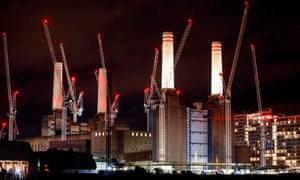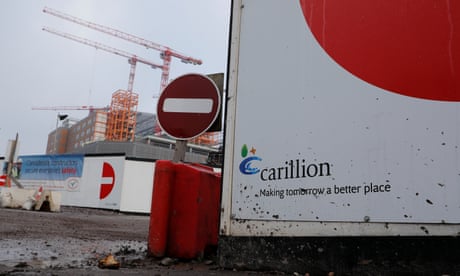
You may never have heard of Carillion. There’s no reason you should have. Its lack of glamour is neatly summed up by the name it sported in the 90s: Tarmac. But since then it has grown and grown to become the UK’s second-largest building firm – and one of the biggest contractors to the British government. Name an infrastructure pie in the UK and the chances are Carillion has its fingers in it: the HS2 rail link, broadband rollout, the Royal Liverpool University Hospital, the Library of Birmingham. It maintains army barracks, builds PFI schools, lays down roads in Aberdeen. The lot.
There’s just one snag. For over a year now, Carillion has been in meltdown. Its shares have dropped 90%, it’s issued profit warnings, and it’s on to its third chief executive within six months. And this week, the government moved into emergency mode. A group of ministers held a crisis meeting on Thursday to discuss the firm. Around the table, reports the FT, were business secretary Greg Clark, as well as ministers from the Cabinet Office, health, transport, justice, education and local government. Even the Foreign Office sent a representative.
Why did Chris Grayling give the HS2 contract to a company that was already in existential difficulties?
That roll call says all you need to know about the public significance of what happens next at Carillion. This is a firm that employs just under 20,000 workers in Britain – and the same again abroad. It has a huge chain of suppliers – and its habit of going in for joint ventures with other construction businesses means that a collapse at Carillion would send shockwaves through the industry and through the government’s public works programme.
To see what this means, take the HS2 rail link, where Carillion this summer was part of a consortium that won a £1.4bn contract to knock tunnels through the Chilterns. If Carillion goes under, what happens to the largest infrastructure project in Europe? What happens to its partners on the deal, British firm Kier, and France’s Eiffage? The project will need to be put back and the taxpayer will almost certainly have to step in.
Imagine that same catastrophe befalling dozens of other projects across the UK and you get a sense of what’s at stake. Jobs will be cut, schools will go unbuilt (just a couple of months ago, Oxfordshire county council pulled the plug on a 10-year schools project) – and the government’s entire private finance initiative (PFI) model for building this country’s essential services will be shaken to the core. The dirty secret of PFI and all government attempts to pass public services into the private realm is that the shareholders make profits while the taxpayers remain on the hook for any losses.
After all, this isn’t the only case where the public sector’s reliance on one giant private-sector player endangers the provision of basic services. As my colleague Rob Davies reports in today’s paper, crisis-hit Four Seasons Health Care has run into yet another roadblock in its rescue talks. If those negotiations fail, then the big question will be who will look after the 17,000 elderly and vulnerable people in its care.

Carillion crisis: fears major government contractor is on the verge of collapse
Or look at rail, where as I wrote this week, transport secretary Chris Grayling has come to a disastrous deal (sorry, “pragmatic solution”) to allow Virgin Trains to get out of their contract to run the East Coast mainline three years early. The public will have to step into the breach with some makeshift arrangements and will forego hundreds of millions in lost franchise payments. The train operators will be able to go about their business and even take on new franchises.
Should Carillion go down, there will be another truckload of questions for Grayling. He awarded the firm its £1.4bn HS2 contract last July – by which time the writing was already on the wall. That job from the Department of Transport may have helped tide Carillion over for a bit – but why did the transport secretary give the work to a company that was already in existential difficulties? A firm known to have grown too quickly by borrowing hundreds of millions. A firm that just a few months later came under investigation of the Financial Conduct Authority. I have long thought that Grayling is less serious minister and more an unexploded landmine. I just wonder what the trigger will be.
But what happens to that minister is just one debacle of many as far as Carillion is concerned. Today you may never have heard of Carillion. Soon you may wish it had remained that way.

